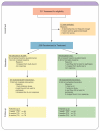Cognitive-behavioral therapy for children with functional abdominal pain and their parents decreases pain and other symptoms
- PMID: 20216531
- PMCID: PMC2887246
- DOI: 10.1038/ajg.2010.106
Cognitive-behavioral therapy for children with functional abdominal pain and their parents decreases pain and other symptoms
Abstract
Objectives: Unexplained abdominal pain in children has been shown to be related to parental responses to symptoms. This randomized controlled trial tested the efficacy of an intervention designed to improve outcomes in idiopathic childhood abdominal pain by altering parental responses to pain and children's ways of coping and thinking about their symptoms.
Methods: Two hundred children with persistent functional abdominal pain and their parents were randomly assigned to one of two conditions-a three-session intervention of cognitive-behavioral treatment targeting parents' responses to their children's pain complaints and children's coping responses, or a three-session educational intervention that controlled for time and attention. Parents and children were assessed at pretreatment, and 1 week, 3 months, and 6 months post-treatment. Outcome measures were child and parent reports of child pain levels, function, and adjustment. Process measures included parental protective responses to children's symptom reports and child coping methods.
Results: Children in the cognitive-behavioral condition showed greater baseline to follow-up decreases in pain and gastrointestinal symptom severity (as reported by parents) than children in the comparison condition (time x treatment interaction, P<0.01). Also, parents in the cognitive-behavioral condition reported greater decreases in solicitous responses to their child's symptoms compared with parents in the comparison condition (time x treatment interaction, P<0.0001).
Conclusions: An intervention aimed at reducing protective parental responses and increasing child coping skills is effective in reducing children's pain and symptom levels compared with an educational control condition.
Figures




References
-
- McGrath PA. Pain in Children: Nature, Assessment, and Treatment. Guilford; New York, USA: 1990.
-
- Schwille IJD, Giel KE, Zipfel S, et al. A community-based survey of abdominal pain prevalence, characteristics, and health care use among children. Clin Gastroenterol Hepatol. 2009;7:1062–8. - PubMed
-
- Drossman DA. Rome III: The Functional Gastrointestinal Disorders. Degnon Associates; McLean, VA, USA: 2006.
-
- Campo JV, Bridge J, Lucas A, et al. Physical and emotional health of mothers of youth with functional abdominal pain. Arch Pediatr Adolesc Med. 2007;161:131–7. - PubMed
Publication types
MeSH terms
Grants and funding
LinkOut - more resources
Full Text Sources
Medical

